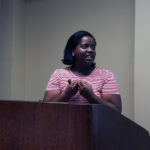Posted: 10/26/07
Yale panelists ask: ‘Is there a theological
foundation for political engagement?’
By Hannah Elliott
Associated Baptist Press
NEW HAVEN, Conn. (ABP)—Theologians, lawyers, pastors and ethicists shared their views on the theological foundations of political engagement during a recent exchange at Yale Divinity School.
The daylong event, called “Voices & Votes II: Shaping a New Moral Agenda,” was co-sponsored by Sojourners, Christianity Today and The Christian Century.
| Greg Boyd |
Greg Boyd, pastor of Woodland Hills Church in St. Paul, Minn., began his remarks by noting the main distinction between governmental power and the power of Christian love is how they’re applied—one entity flaunts its power over people, and the other sacrifices its power through love.
The American ideal of life, liberty and happiness is good, but it’s exactly opposite what Christ told his followers, Boyd said. Instead, Jesus urged his disciples to lay down their lives and give up their rights when wronged.
“I think it’s wonderful to debate political issues, and we’re doing that, but the goal of the kingdom is to get people free of what politics fights for—life, liberty and the pursuit of happiness,” Boyd said. “It seems to me that is something the kingdom of God directly speaks against.”
Serene Jones, on the other hand, strongly protested Boyd’s assertion. Christians are called to be happy in Christ, she said.
“I completely disagree that we are not called to be happy as Christians,” said Jones, a theology professor at Yale Divinity School. “We need to take pleasure and joy about who we are in the world.”
 |
| Serene Jones |
Jones confessed she often finds herself frustrated that more people don’t debate war, torture, homosexuality and abortion in a “distinctly theological mode.” For her, theology has deeply political implications.
“How do we engage in an honest theological discussion about (homosexuality) without thinking in a sustained way about what God’s … relation to our human bodies is?” she asked. It often comes down to how people perceive God, she said.
“Do you primarily have a wrathful God?” she asked. “Or do you have a God of compassion and grace who is primarily smiling or worrying about the world? What a profound thing it would be if that were the starting point for some of our discussions about abortion (and) homosexuality.”
Andy Crouch, who is working on a series of short documentary films about a Christian counterculture, also talked about the meaning of power. If Christians want to discuss politics and religion seriously, they have to evaluate their views on power, he said.
When Christians usually think about power in politics, they often think they don’t have enough, said Crouch, a former campus minister with InterVarsity Christian Fellow-ship. But that isn’t a biblical view—the biblical perspective is one of reversal, he said.
“Jesus goes to the cross with this unbelievable confidence in another power” that comes from above, not from government, Crouch said.
As leader of Sojourners, Jim Wallis has firm beliefs about how Christians should influence political power. Jesus created a new world order, Wallis said, and Christians embody that change.
“God is personal but never private,” he said. “The question is, ‘How is God public?’”
Wallis said that when Christians fight against slavery, social ills or sex trafficking, “that shows God is alive.”
The kingdom of God transforms the world by translating the specifics of injustice, he said.
The church as an institution should be political but not partisan, he insisted.
“The church is the conscience of the state,” Wallis said. “There is a biblical role for the state, just as there is for the church. And they’re not the same.”
Stephen Carter, a professor at Yale Law School, said much the same. Christians should keep “their hands off the levers and simply be the voice crying in the wilderness,” he asserted.
Carter tells his law students never advocate for a law for which they are not willing to kill.
That mindset will keep his students humble, especially in light of new ways they approach politics and world views, he said.
While the baby boomer generation came up with grand plans to change the world through national and international platforms, this generation’s young politicos focus more on grassroots activism, Carter said.
“It’s not just a suspicion of grand plans, it’s an opposition,” he said. “The passion for (large-scale) engagement seems to be weakening.”
Crouch, too, said he does not encounter the political clarity of past generations, and he noted that people “tend to think much more granularly. They think in terms of their neighbor.”
Wallis urged a more national, systematic approach.
“At some point, you can’t keep pulling bodies out of the river and not move up the river at some point to see who’s throwing them in,” he insisted.














We seek to connect God’s story and God’s people around the world. To learn more about God’s story, click here.
Send comments and feedback to Eric Black, our editor. For comments to be published, please specify “letter to the editor.” Maximum length for publication is 300 words.